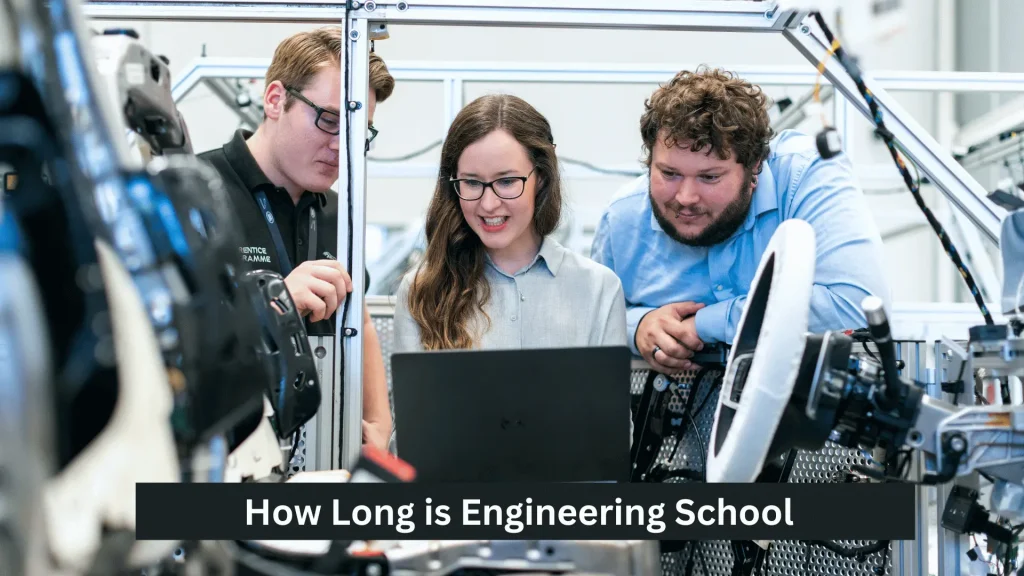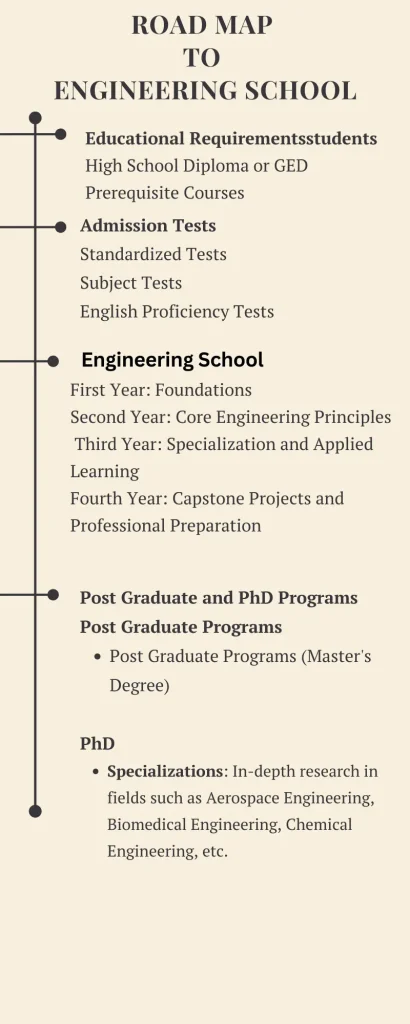How Long is Engineering School
How Long is Engineering School? Typically, an engineering bachelor’s degree program takes about four years to complete. However, the duration can vary depending on the institution and the student’s pace. Some students may take longer if they pursue co-op programs or internships, which provide valuable hands-on experience.
What is Engineering School
Engineering school is an academic institution or program that focuses on educating students in various engineering disciplines. These schools offer undergraduate and graduate degrees in fields such as civil, mechanical, electrical, and computer engineering. The curriculum combines theoretical knowledge with practical skills, preparing students for careers in engineering industries.

Engineering school provides a rigorous education in mathematics, science, and technology, equipping students with problem-solving and analytical skills. Students engage in projects, laboratory work, and internships to apply their knowledge in real-world scenarios. Graduates from engineering schools are in high demand and can pursue careers in a wide range of industries, including construction, manufacturing, and technology.
How Long is Engineering School
First Year: Foundations
Courses: Introduction to Engineering, Calculus, Physics, Chemistry, and General Education.
Focus: Building a strong foundation in mathematics and basic sciences, along with an introduction to engineering principles.
Activities: Orientation to engineering disciplines, basic lab work, and developing problem-solving skills.
Second Year: Core Engineering Principles
Courses: Intermediate Engineering courses (such as Statics, Dynamics, Thermodynamics), Advanced Calculus, Differential Equations, and Computer Programming.
Focus: Delving deeper into core engineering subjects and starting to specialize in a particular field of engineering.
Activities: More hands-on lab work, team projects, and possibly beginning design projects.
Third Year: Specialization and Applied Learning
Courses: Specialized courses related to the chosen engineering field (e.g., Electrical Circuits, Fluid Mechanics, Structural Analysis), along with elective courses.
Focus: Applying theoretical knowledge to practical problems and starting to work on more complex engineering projects.
Activities: Advanced lab work, design projects, internships, or co-op programs for real-world experience.
Fourth Year: Capstone Projects and Professional Preparation
Courses: Capstone Design Project, Engineering Ethics, and remaining specialized elective courses.
Focus: Synthesizing all the knowledge and skills acquired to complete a major project, often in collaboration with industry partners.
Activities: Completing a capstone project, preparing for professional certification exams, job searching, and possibly presenting research at conferences.
Throughout the program, students will also engage in various extracurricular activities, such as engineering clubs, competitions, and networking events, to enhance their learning experience and prepare for a successful engineering career.

HOW TO ENTER Engineering SCHOOL
Educational Requirements
High School Diploma or Equivalent: Completion of high school education with a focus on mathematics, physics, and chemistry.
Prerequisite Courses: Strong foundation in advanced mathematics (Algebra, Geometry, Calculus), and sciences (Physics, Chemistry).
GPA Requirements: Minimum GPA requirement varies by school, often around 3.0 or higher.
Entry Tests
Standardized Tests: SAT or ACT scores are typically required for admission.
Subject Tests: Some schools may require or recommend SAT Subject Tests in Mathematics and Science.
English Proficiency Tests: For international students, TOEFL or IELTS scores may be required.
Application Process
Application Form: Complete the college’s application form, which may be available online.
Personal Statement: Write a personal essay or statement of purpose explaining your interest in engineering and career goals.
Letters of Recommendation: Obtain letters from teachers, counselors, or professionals who can speak to your academic abilities and character.
Transcripts: Submit official high school transcripts and any other relevant academic records.
Application Fee: Pay the application fee, although fee waivers may be available for eligible students.
Financial Aids
Scholarships: Merit-based scholarships for academic excellence or specific achievements.
Grants: Need-based grants provided by the federal government, state, or the institution.
Loans: Federal or private student loans that must be repaid after graduation.
Work-Study Programs: Opportunities to work part-time on campus to help cover tuition and other expenses.
FAFSA: Complete the Free Application for Federal Student Aid (FAFSA) to determine eligibility for federal financial aid.
Institutional Aid: Financial aid packages offered directly by the college or university, which may include a combination of scholarships, grants, and loans.
Each institution may have specific requirements and processes, so it’s important to check the individual engineering school’s website for detailed information.
Post Graduate and PhD Programs for Engineering School
Post Graduate Programs (Master’s Degree)
Specializations: Advanced studies in specific fields such as Civil Engineering, Mechanical Engineering, Electrical Engineering, Computer Engineering, Environmental Engineering, etc.
Duration: Typically 1-2 years.
Requirements:
Bachelor’s degree in engineering or a related field.
Minimum GPA (varies by institution, often around 3.0 or higher).
GRE scores (some programs may waive this requirement).
Letters of recommendation.
Statement of purpose.
Resume/CV.
Curriculum:
Advanced coursework in chosen specialization.
Research projects.
Thesis (for thesis-based programs) or additional coursework/projects (for non-thesis programs).
PhD Programs
Specializations: In-depth research in fields such as Aerospace Engineering, Biomedical Engineering, Chemical Engineering, etc.
Duration: Typically 4-6 years.
Requirements:
Master’s degree (some programs accept students with a bachelor’s degree directly into the PhD program).
High GPA (varies by institution).
GRE scores.
Letters of recommendation.
Statement of purpose.
Research proposal.
Resume/CV.
Curriculum:
Advanced coursework.
Comprehensive exams.
Original research leading to a dissertation.
Teaching assistantships or research assistantships.
Top 10 Engineering Schools

- Massachusetts Institute of Technology (MIT)
Known for cutting-edge research and innovation in engineering and technology.
- Stanford University
Renowned for its entrepreneurial spirit and strong ties to Silicon Valley.
- California Institute of Technology (Caltech)
Famous for its rigorous academic environment and pioneering research.
- University of California, Berkeley (UC Berkeley)
Offers a wide range of engineering programs and research opportunities.
- Georgia Institute of Technology (Georgia Tech)
Known for its strong emphasis on practical and applied engineering.
- University of Illinois at Urbana-Champaign
Recognized for its excellent engineering faculty and research facilities.
- University of Michigan, Ann Arbor
Offers diverse engineering disciplines and strong industry connections.
- Carnegie Mellon University
Famous for its robotics and artificial intelligence research.
- Purdue University
Offers comprehensive engineering programs and a strong alumni network.
- University of Texas at Austin
Known for its research output and strong engineering programs.
These schools are recognized globally for their contributions to engineering education, research, and innovation. Each institution offers unique strengths and opportunities for students pursuing advanced degrees in engineering.
Factors Affecting the Length of Engineering School
The length of an engineering school program can vary based on several factors. Here’s a detailed breakdown of these factors:
1. Type of Engineering Degree
Bachelor’s Degree:
Typical Duration: 4 years.
Factors: Standard length for most undergraduate engineering programs.
Variations may occur based on the specific engineering discipline or institution.
Master’s Degree:
Typical Duration: 1-2 years.
Factors: Duration depends on whether the program is research-based (thesis required) or coursework-based (no thesis required).
PhD Degree:
Typical Duration: 4-6 years.
Factors: Duration is influenced by the complexity of research, time required for dissertation, and other academic requirements.
2. Course Load and Enrollment Status
Full-Time vs. Part-Time Enrollment:
Full-Time: Accelerates program completion with a heavier course load.
Part-Time: Extends the duration of the program due to a reduced course load.
3. Co-op and Internship Programs
Incorporation of Work Experience:
Co-op Programs: Integrate periods of professional work experience, which can extend the length of the degree by an additional semester or more.
Internships: May be optional but can also impact the time spent completing the degree if undertaken.
4. Academic Performance
Course Retakes:
Impact: Students who need to retake courses due to poor performance will take longer to complete their degree.
Academic Advising:
Role: Effective academic advising can help students stay on track and avoid unnecessary delays.
5. Specialization and Elective Choices
Specialized Tracks:
Impact: Choosing specialized tracks or elective courses may extend the time needed to complete the degree.
Examples: Advanced electives, dual degree options, or minors.
6. Availability of Courses
Course Scheduling:
Impact: Limited course availability or scheduling conflicts can delay graduation.
Planning: Proper course planning and early registration can help mitigate this issue.
7. Student’s Prior Knowledge and Background
Advanced Standing:
AP Credits: Advanced Placement (AP) credits or previous college coursework can shorten the duration.
Transfer Credits: Acceptance of transfer credits from other institutions can also impact the length of the program.
8. Program Structure and Requirements
Curriculum Design:
Impact: Some programs have a rigid structure with sequential courses, while others offer more flexibility in course selection.
Examples: Programs with extensive lab work, project requirements, or comprehensive exams may take longer.
9. Research and Thesis Requirements
Research-Based Programs:
Impact: Programs requiring a significant research component or thesis may extend the length of the degree.
Examples: Master’s programs with a thesis requirement or PhD programs with extensive research work.
10. Institutional Policies and Accreditation
Program Accreditation:
Impact: Accreditation requirements may influence program structure and length.
Examples: ABET accreditation standards for engineering programs.
Final Verdict
In summary, the length of engineering school varies depending on factors like degree type, enrollment status, and personal circumstances. Understanding these elements can help you plan your education path and manage expectations for completing your engineering degree.
FAQs
1. How long does it take to complete a bachelor’s degree in engineering?
Typically, it takes about 4 years to complete a bachelor’s degree in engineering.
2. What factors can extend the length of an engineering degree program?
Factors include part-time vs. full-time status, co-op programs, course load, and academic performance.
3. Are there ways to shorten the duration of an engineering degree?
Yes, advanced placement credits, transfer credits, and efficient course planning can help shorten the degree duration.
4. How long does a master’s program in engineering take?
A master’s degree in engineering generally takes 1-2 years to complete, depending on whether it’s a thesis or non-thesis program.
5. What is the typical duration of a PhD program in engineering?
A PhD in engineering usually takes 4-6 years, depending on the research complexity and dissertation requirements.
